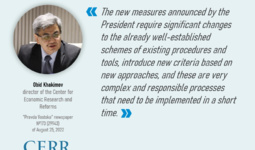In recent years, a number of reforms have been implemented in Uzbekistan to improve the efficiency of public administration.
The last three years, over 30 concepts and strategies have been adopted for the accelerated development of priority areas of the socio-economic sphere. For the next five years, important tasks have been set to ensure high economic growth.
Changes in the public administration system are a guarantee of the success of reforms in other areas.
Dilfuza Rakhimova from the Academy of Public Administration in her author's article talks about parliamentary reforms, problems and reforms of the civil service.
Throughout the entire period of independence, the state system of Uzbekistan has undergone significant changes to develop. It is noticeable that changes have occurred with the adoption of the Action Strategy for the five priority areas of development of Uzbekistan in 2017 – 2021, which are strengthening the role of parliament and political parties, reforming the public administration system, developing the organizational and legal foundations of the civil service, as well as reforming the judicial and legal system.
The implementation of this strategy has made it possible in recent years to carry out a radical modernization of the country's power structures. Significant successes were achieved in terms of ensuring the horizontal balance of state power: the role of the Oliy Majlis has significantly increased. The efficiency of the judicial system has considerably improved due to the optimization of the higher judicial bodies and the introduction of a harmonious structure of territorial courts, depending on the type of issues they are considering. A radical administrative reform has been carried out, modernization and renewal of the structures of state and economic management have been carried out.
Parliamentary transformations
The strategic goal of the reforms is to build a democratic state that ensures democratic principles and personal freedoms of its citizens, their guarantee and protection. Significant steps in this direction have been made in recent years, when an electronic portal and applications in social networks were launched to intensify dialogue with the people, allowing MPs (Members of Parliament) to keep in touch with voters. This system is designed to work in such a way that the voter can follow the daily activities of the deputy, discuss draft laws and express their opinion about them.
It should be noted that in the World Bank's Governance Indicator, Uzbekistan's position in 2019 improved by 5 indicators. This was based on the reforms carried out, such as an effective system of dialogue, research of people's problem and contributing to their solution.
Today they make up 25% of the members of the Oliy Majlis and 32% of the deputies of the Legislative Chamber. The overwhelming majority of the deputies and senators of the new convocation are newly elected. In total, the parliament consists of 4/5 new members. As for the average age, both chambers "matured" by an average of three years compared to the last: 46 and 57 years, respectively, against 43 and 54 in 2015. In recent years, the indicators of the representation of women in the executive branch have also increased almost 5 times - from 3.4% to 16%.
Judicial reform
In the context of the main directions of work stated by the "Strategy of five actions", the Decree of the President of the Republic of Uzbekistan dated February 21, 2017, No. UP-4966 "Measures to improve the structure and increase the efficiency of the judicial system of the Republic of Uzbekistan" was issued.
By this decree, the Supreme Judicial Council of the Republic of Uzbekistan was formed, designed to assist in ensuring compliance with the constitutional principle of the independence of the judiciary in the Republic of Uzbekistan. The main tasks of the council were identified:
• the formation of the judiciary based on a competitive selection of candidates for the positions of judges, the appointment of judges among the most qualified and responsible specialists;
• taking measures to prevent violations of the immunity of judges and interference in their activities;
• implementation of interaction with the media;
• preparation of proposals for further improvement of legislation in the judicial and legal sphere;
• Consideration of issues bringing to disciplinary responsible judges.
This Presidential Decree introduced the concept and typical structure of administrative courts - specialized courts of regional, district and city levels, whose tasks would include consideration of administrative disputes arising from public relations, as well as cases of administrative offences. Another important change was the transformation of economic courts into economic ones. Thus, the territorial judicial bodies acquired a clear specialization: economic, administrative, civil, military and criminal.
The changes set out in the Presidential Decree (February 21, 2017) were reflected in the amendments to the Constitution of the Republic of Uzbekistan dated May 31, 2017. The law introduced amendments to Articles 80, 81, 83, 93, 107, 110, 111, 112 of the Constitution of the Republic of Uzbekistan, aimed at reforming the country's judicial system. In accordance with these amendments, the Supreme Economic Court and the Supreme Court of the Republic of Uzbekistan were merged into a single supreme judicial authority in the field of civil, criminal, administrative and economic justice - the Supreme Court of the Republic of Uzbekistan. Within the framework of these amendments, economic and administrative courts were also formed.
Among other things, amendments were made to article 93 in the Constitution of the Republic of Uzbekistan. Members of the Constitutional Court are elected by the Senate of the Oliy Majlis among persons recommended by the Supreme Judicial Council, including a representative from the Republic of Karakalpakstan. The powers of the Constitutional Court were also expanded.
Administrative reform
On September 8, 2017, by Presidential Decree No. UP-5185, the Concept of Administrative Reform of the Republic of Uzbekistan was approved. The text of this Decree outlined several existing systemic problems that hinder the achievement of the goals of the "Strategy of Five Actions", in particular:
- the declarative nature of the tasks assigned to individual executive authorities;
- ineffectiveness of the current system of coordination and control over the activities of executive authorities;
- lack of a clear definition of responsibility among executive authorities;
- Excessive centralization of state functions and powers lead to a decrease in the role of local executive authorities;
- combination of state regulatory and economic functions by the economic management bodies;
- underdevelopment of social and public-private partnership, which limits the participation of NGOs and business entities in solving urgent socio-economic problems;
- Lack of openness and lack of transparency in the activities of executive authorities.
The approved Concept included a list of specific tasks aimed at solving the problems identified in the text of the Decree. In terms of improving the institutional, organizational and legal framework for the activities of public authorities, the Concept defines the following key areas:
- introduction of clear criteria and procedures for the creation and abolition of executive bodies, including territorial subdivisions, to prevent an unjustified increase in the number of civil servants;
- optimization of the structure of the executive authorities to eliminate the imbalance between the republican and territorial executive authorities and the rational distribution of resources between them;
- increasing the independence and responsibility of executive authorities and their leaders for the implementation of state policy;
- further implementation of the "Electronic government" system and modern ICT in the activities of executive authorities;
- improvement of the system for the provision of public services (implementation of the "one window" principle, development of administrative regulations)
- development of the administrative justice system by improving the procedure for appealing against decisions and actions of executive authorities.
The concept also included a list of tasks aimed at improving quality control of managerial decisions:
- the introduction of an effective system of control was prescribed: "President Administration - Cabinet of Ministers - republican government bodies - structural and territorial subdivisions - local executive authorities";
- drastic reduction of interdepartmental collegial bodies (commissions, councils, working groups, etc.)
- increasing initiative and strengthening the role of territorial executive bodies in the formation of state and regional development programs;
- introduction of a new system for assessing the performance of executive authorities at all levels, based on the achievement of target indicators.
- introduction of a “smart regulation” model and a standardized methodology for analyzing the regulatory impact of decisions taken, which provides legal acts without a proper assessment of their impact;
- improvement of regulatory instruments by transferring certain state functions to subjects of public control;
- introduction of modern methods of work organization (quality management, indicative planning, outsourcing, crowdsourcing);
- widespread introduction of modern forms of work with the public in the process of developing development programs and monitoring their implementation.
Civil service problems
The issue of organizing the civil service in Uzbekistan remains one of the most urgent since independence. For a long time, the questions of the structure, positions and classes of civil servants remained vague.
The first document in which an attempt was made to clarify the status of a civil servant and to bring some clarity to the issues of entering the civil service was the Law of the Republic of Uzbekistan dated December 9, 1992, No. 746-XII "On the Prosecutor's Office". In this law, the functions and goals of the institution of the prosecutor's office clarified in sufficient detail. An integral document supplementing this law was the Resolution of the Supreme Council of the Republic of Uzbekistan dated December 9, 1992, No. 748-XII "On approval of the regulation on class ranks and the encouragement and disciplinary responsibility of employees of the prosecutor's office of the Republic of Uzbekistan." In this provision, the structure of class ranks and the corresponding positions of the civil service was disclosed in detail, the maximum terms of tenure in certain positions were established and the general procedure for incentives and penalties was described.
The Law "On Courts", the Law of the Republic of Uzbekistan of September 2, 1993, No. 913-XII "On State Power in the Localities" was adopted, which determined the status of the regional heads - governors. At the same time, this law practically did not touch upon the issues of the structure of civil service posts at the level of regions, districts and cities, obviously leaving this issue at the discretion of the governors in the corresponding level. This law did not pursue the goal of building a civil service system but was extremely necessary for building a vertical of power in the first years of Uzbekistan's independence.
This was followed by the adoption of laws "On the Cabinet of Ministers of the Republic of Uzbekistan" (1993), "On Notaries" (1996), "On the State Customs Service" (1996), "On the State Tax Service" (1997. ), "On general conscription and military service" (2002), "On the rescue service and the status of the rescuer" (2008), "On the internal affairs bodies" (2016).
Many problems of normative regulation of the public service at the early stage of its formation were explained by the heterogeneity of the structure of normative legal acts. In fact, during the formation of each new government body, legislators had to re-describe the qualification requirements, classes, ranks and levels of social guarantees of civil servants, although the nature of their work and the conditions of admission were largely comparable.
Attempts were repeatedly made to reverse the situation in the civil service system. Initially, the measures taken were aimed primarily at preventing an uncontrolled increase in the number of civil servants. In 1996 and 2003, the country's top leadership initiated two large-scale reductions in the personnel of the highest and regional executive bodies. These measures made it possible to achieve the ratio of civil servants concerning the population of the country up to 6 to 1000 inhabitants.
At the same time, these measures could not solve the systemic problems associated with insufficient regulatory regulation of the selection and admission of citizens to the civil service. In 2016, an attempt was made to establish professional criteria for citizens recruited to state bodies - the Resolution of the Cabinet of Ministers of the Republic of Uzbekistan "On Approval Model Rules of Ethical Conduct for Employees of State Government Bodies and Local Executive Bodies" was adopted.
This decree established the principles of the official conduct of civil servants, the same for all types of civil service. According to paragraph 5 of the Regulation, civil servants must carry out their professional activities based on the following principles:
- legality;
- priority of the rights, freedoms and legitimate interests of citizens;
- patriotism and loyalty to the official duty;
- loyalty to the interests of the state and society;
- fairness, honesty and impartiality,
- avoidance of conflicts of interest.
Civil service reform
The most significant steps towards reforming the civil service in Uzbekistan were taken after the adoption on February 7, 2017, of the “Strategy of five actions” and “Concept of administrative reform in the Republic of Uzbekistan”. The roadmap of the Concept includes a clause on the development of the Draft Law "On Civil Service", as well as several by-laws aimed at combating corruption and regulating the selection system for civil service positions. The draft Civil Service Law was soon published and made available for public comment. Currently, this most important document includes 8 parts and 78 articles. Active assistance to the state in this matter is provided by the academic community of the Republic of Uzbekistan. One of the significant results of this interaction was the holding of the republican competition for the selection of promising management personnel "Tarakkiyot". The organizers of the competition were the Academy of Public Administration under the President of the Republic of Uzbekistan and the non-profit organization Buyuk Kelajak. The competition is planned to be held every 3 years. According to the conditions, citizens of the Republic of Uzbekistan aged 30 to 45, inclusive, who have higher education and at least three years of experience in leadership positions in the relevant field, can take part in the competition. The winners of the competition are appointed to leadership positions in government organizations in the relevant areas, while the finalists of the competition are included in the managerial personnel pool.
In 2019, the country's leadership took measures to improve personnel policy. On October 3, 2019, the Decree of the President of the Republic of Uzbekistan "On measures to radically improve the personnel policy and the system of state civil service in the Republic of Uzbekistan" came into force. The main result of this decree was the creation of the Agency for the Development of Civil Service under the President of the Republic of Uzbekistan (ARGOS), reporting directly to him. The main tasks of the agency included:
- Development of an ideological platform for the transformation of the civil service, programs and projects for its development, as well as ensuring the practical implementation of a unified policy in the field of civil service.
- Coordination of the activities in the field of state personnel policy.
- Monitoring and analyzing the tendency and prospects for the development of the civil service with the development of proposals for eliminating problems and challenges in this area.
- Implementation of innovative methods of personnel management and development of human resources.
- Management of the National Personnel Reserve, maintaining the State Register of Civil Service Positions.
- Introduction of a system of measurable indicators (key indicators) for assessing the performance of civil servants.
- Carrying out systematic work to identify and attract qualified and highly qualified specialists.
- Organization of an open, independent competitive selection of the most promising personnel for the state civil service.
- Introduction and consistent improvement of ICT in the field of public civil service.
- Providing assistance in protecting the rights and legitimate interests of public civil servants.
The same Decree established that admission to the state civil service in state bodies and organizations from January 1, 2021, is carried out based on an open independent competitive selection, this procedure applies to all state bodies and organizations of the Republic of Uzbekistan, which provide for a state civil service.
The role of ARGOS as a regulator will be very significant. According to the Decree, persons entering the civil service based on an independent competitive selection cannot be dismissed from office without the consent of ARGOS and its branches. Besides, ARGOS will carry out an examination of all regulatory legal acts on the regulation of the state civil service, including remuneration and material incentives. Heads of personnel departments of state organizations will be appointed and dismissed from office in agreement with ARGOS and its branches.
Another important task assigned to the new Agency was the organization of international internships for civil servants. According to the Decree of the President of the Republic of Uzbekistan dated October 3, 2019, ARGOS, together with the Ministry of Foreign affairs, the Ministry of Investments and Foreign Trade, the Ministry of Finance and the Academy of Public Administration under the President of the Republic of Uzbekistan are developing a five-year program for a phased direction for an internship from 3 to 6 months at least 1000 of the most promising middle and lower-level employees of state and organizations. Under the Resolution, persons sent for a foreign internship must be paid a salary in the amount of 60 percent of the salary of the Ambassador of Uzbekistan in the host country.
Currently, in the Decree "On cardinal improvement of the system of organizing the training of specialists abroad and the development of the potential of civil servants" 56 states of the world are proposed as places for foreign internships, including such neighboring countries as Kazakhstan and the Russian Federation, as well as the most developed countries like Europe, Asia and America.
The system of civil service in Uzbekistan is in the process of development. To complete this process, the adoption of uniform system-forming laws is required, however, despite their absence, the country's leadership is making efforts to improve the quality of the civil service.
Conclusion
Uzbekistan has carried out several reforms to improve the efficiency of public administration in recent years. As part of the implementation in the Concept of Administrative Reforms, 12 new state bodies were created, the activities of 20 ministries and departments were radically transformed. Over the past three years, over 30 concepts and strategies have been adopted for the accelerated development of priority areas in the socio-economic sphere. For the next five years, important tasks have been set to ensure high economic growth, the development of industries and the social sphere. It is necessary to double the gross domestic product - from 58 to 100 billion dollars and raise the living standards of the population, which cannot be achieved without effective public administration.
Dilfuza Rakhimova,
Academy of Public Administration
Under the President of the Republic of Uzbekistan





















leave a comment